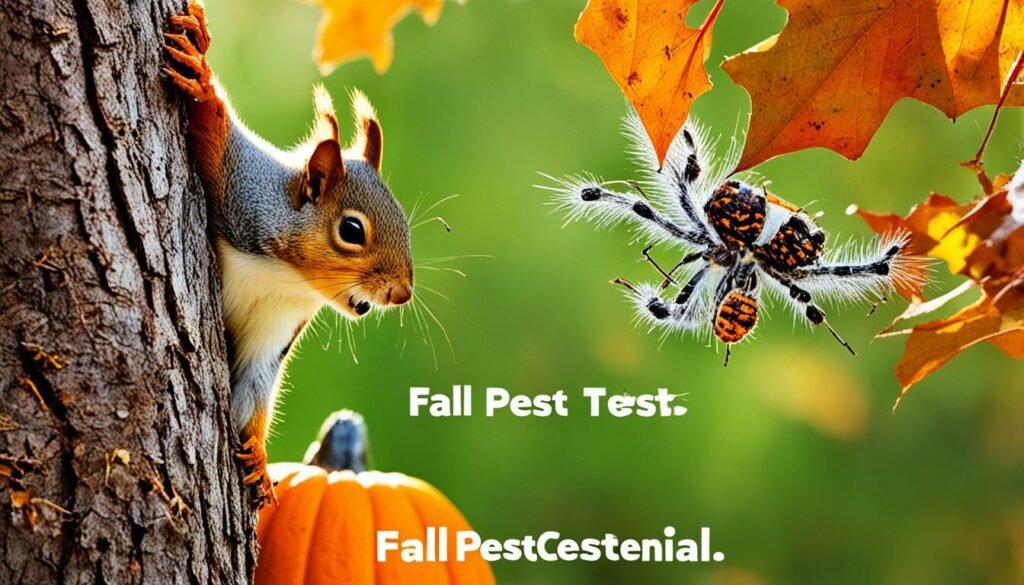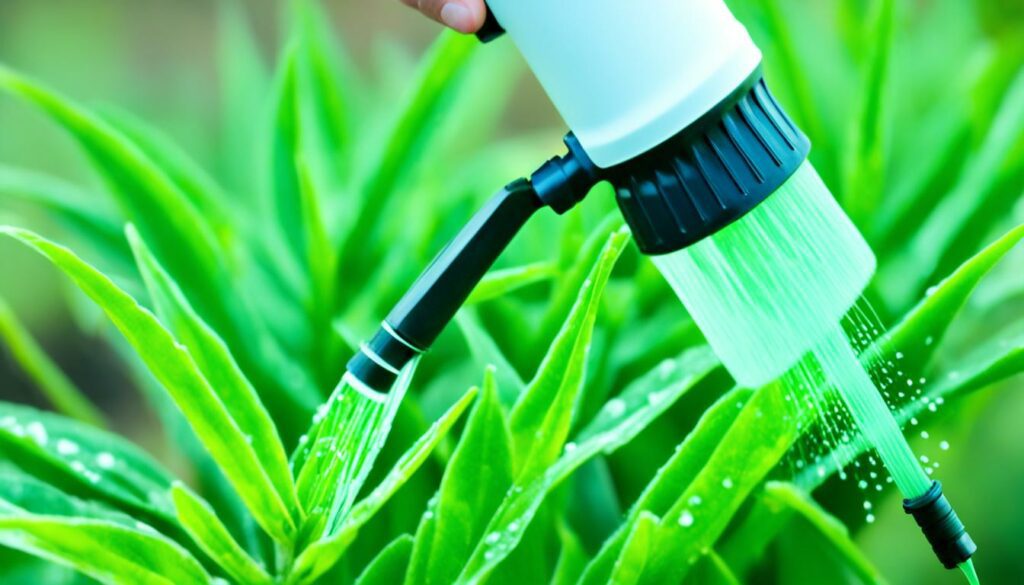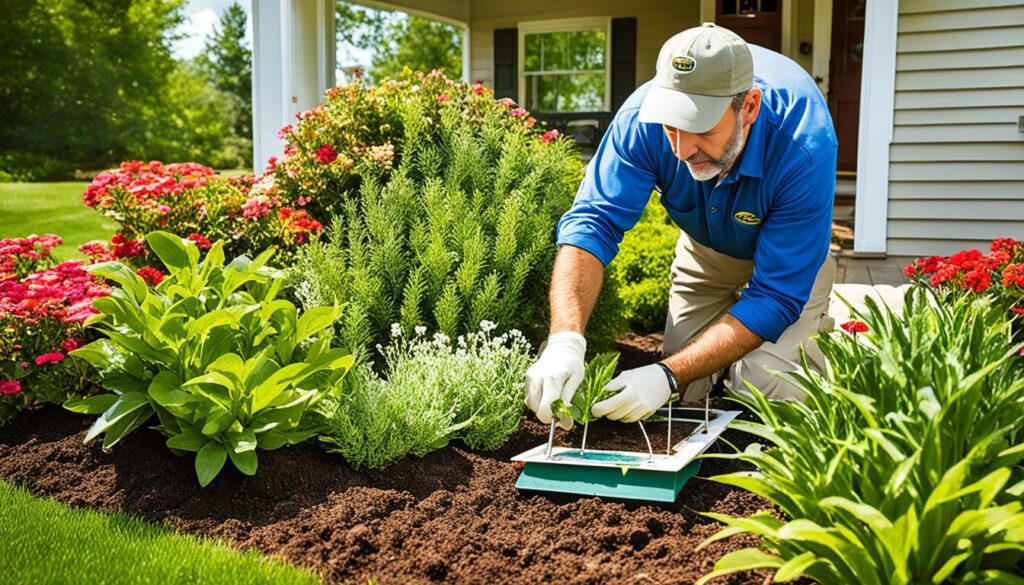Menu

Did you know that termites cause over $5 billion in home damage annually in the United States? This shows why seasonal pest control is vital. It helps protect your home from pests that are most active each season. By learning about these pests’ habits, homeowners can use the right methods to keep their homes safe.
As the seasons change, so do the pests’ behaviours. Spring sees more ants, termites, and rodents. Summer means more mosquitoes, ticks, and flies. In autumn, you might find spiders and cockroaches inside. Winter brings mice, rats, and indoor spiders. Each season has its own pest problems, needing specific solutions. This guide has tips from experts to keep your home pest-free all year round.
Insects and rodents act differently in each season, affecting the chance of them getting into our homes and workplaces. This makes it important to use the right pest control methods for each season. Understanding these patterns helps us keep pests away effectively.
Pests change their habits with the weather. Warmer months draw in pests like ants, flies, and mosquitoes, making us see them more often. In colder months, rodents come inside looking for warmth, which means we need special ways to control them.
Every season has its own pests, needing special approaches to control them:
Knowing about these patterns lets people deal with pests more effectively. They can use seasonal pest prevention methods to avoid common pests and keep their surroundings pest-free year-round.
Springtime in Alabama means more bugs. It’s important to have good pest control plans. Knowing what pests are around and treating for them keeps your house safe. I’ll tell you how to deal with ants, termites, and mosquitoes. I’ll also talk about sealing up your home.
In spring, ants and termites are very active. You must treat your home to keep them out. For ants, put down bait and barriers. This helps stop them coming inside. To beat termites, you need a stronger plan. You may need pros to use chemicals and set up baits.

Spring also means lots of mosquitoes in Alabama. They love standing water. So, get rid of any still water. Treat what you cant remove with larvicides. And use barriers in your yard. This stops mosquitoes and disease, like West Nile and Zika.
Keep pests out by sealing up your home. Check windows, doors, and the foundation for gaps. Fix any you find. Also, keep food sealed tight. This makes your home less attractive to bugs and rodents.
| Pest | Spring Activity | Control Methods |
|---|---|---|
| Ants | Seeking food sources | Baits, barrier applications |
| Termites | Nesting near structures | Professional treatments, bait systems |
| Mosquitoes | Breeding in standing water | Eliminate water sources, larvicides, barrier sprays |
These steps will help you deal with spring pests in Alabama. Acting early makes your home safer and healthier. It also saves you from dealing with expensive damage later on.
As the weather warms up, pests become more active. It’s important to control them in summer. The heat brings ants, flies, and stinging insects looking for food and water. With the right pest control methods, you can keep your home pest-free all summer.
Dealing with flies and ants in summer means using baits and barriers. Ants come looking for sweets at picnics and barbecues. Placing bait stations and barriers can help keep them away.
Flies love warm weather and can be a big bother. You can use fly traps to catch them and keep things clean. Make sure to dump the rubbish and store food away properly to stop flies breeding.
Getting rid of stinging insect nests like bees and wasps is very important. They can be dangerous, especially to people allergic to their stings. It’s smart to regularly check for nests in your eaves or sheds. If you find one, get a professional to take it out safely.
Fly traps are key in keeping flies under control in summer. They’re great for cutting down the fly numbers. Here’s how to use them well:
By using these methods, you can cut the fly count and enjoy a nicer summer.
| Season | Common Pests | Pest Control Methods |
|---|---|---|
| Spring | Ants, Termites | Baits, Barrier Applications |
| Summer | Flies, Stinging Insects | Fly Traps, Nest Removal |
| Fall | Rodents, Cockroaches | Bait Stations, Sealing Entry Points |
| Winter | Rodents, Bed Bugs | Insecticides, Steam Treatments |
Be sure to do regular checks and take steps to stop pests coming in. By following these tips, your home will be safer and more enjoyable in the summertime.
As the weather gets cooler, fall pest control is very important. More pests like rodents and cockroaches look for food and warmth inside our homes. I’ll share some key strategies to fight these common autumn pests.

Mice and rats often get into our homes to avoid the cold. Knowing how they behave helps us stop them. Key steps include using bait stations and traps in problem areas, which can be very effective. Also, natural solutions like essential oils and diatomaceous earth are good for the environment.
Preventing cockroaches is crucial in the autumn. They look for places with food and water. To keep them out, clean well, remove food bits, and fix any water leaks. Sealing up entry points and using things like citrus peels and vinegar can help keep them away.
It’s vital to stop pests from entering your home in autumn. Ants, spiders, and cockroaches can sneak in through small openings. So, seal off any cracks or holes in your walls, windows, and doors. It’s also a good idea to use door sweeps and trim shrubs outside. These steps not only reduce pests but also protect your home’s structure.
Winter makes pests like insects and rodents seek shelter from the cold inside our homes. So, it’s key to stay on top of pest control at this time.
During winter, mice and rats try to get indoors. They fit through tiny holes. Regularly checking for these entry points is crucial to keep them out.
Bed bugs are a concern in the winter, aiming for indoor warmth. Using steam or insecticides is important for control. Key methods include:
It’s important to keep an eye out for rodents all winter. Signs like droppings or nibbled items tell you they’re around. Using traps and baits smartly in combination with other rodent and pest control steps is vital. This includes storing food in tightly sealed containers and drying up any damp areas.
To wrap it up, staying ahead with pest control in winter is a must. Actively seal small entry points and use bed bug treatments to keep your home cosy and free from pests in the colder months.
| Pest Control Measure | Description |
|---|---|
| Seal Cracks | Prevent pests like rodents and insects from entering by closing potential entry points. |
| Store Firewood Properly | Keeping firewood away from the home reduces the likelihood of pests nesting nearby. |
| Weatherstrip Doors and Windows | Enhances insulation and prevents pest entry. |
| Monitor for Rodent Activity | Regular inspections and using traps help in early detection and control. |
| Implement Rodent and Pest Control Techniques | Combining various strategies ensures comprehensive pest management. |
Keeping pests away all year needs steady work. Look for pests often, act early, and treat problems in a way that fits. This stops small issues from turning into big ones.
Checking for pests regularly is key. By looking often, you can find problems before they get bad. Watch out for signs like droppings, gnaw marks, or messed up food. This stops pests from making themselves at home. Don’t forget to check and seal your home in autumn. Covering cracks and holes helps keep out rodents.

Preventing pests is easier than getting rid of them. Make sure your windows have good screens to keep out flying bugs. Also, keep your gutters clean to stop pests from breeding in them. If you have firewood, store it far from your house and up off the ground. This helps keep termites and ants away.
Each pest and each season need their own plan. In places like Savannah, pests come at different times. They might be outside in spring and summer but want inside in autumn and winter. Pros can handle pests using methods that suit the season and pest type. This way, dealing with them is more effective. Also, it saves time and money.
| Pest | Season of High Activity | Prevention Tips |
|---|---|---|
| Ants | Spring | Seal entry points, store food in airtight containers |
| Rodents | Fall and Winter | Inspect and seal cracks, clean nesting areas |
| Mosquitoes | Summer | Eliminate standing water, use larvicides |
| Termites | Spring | Store firewood away from home, inspect foundations |
Finding signs of pests early can prevent big troubles and costs for homeowners. It’s key to watch for these clues to keep your home pest-free.
Pests can also cause damage to your home’s structure. Termites, for instance, can weaken walls and floors. This can lead to big repair bills. If you notice plants are being chewed up, this can also be a sign of pests.
Watch for changes in your pets’ behaviour, such as lots of scratching or avoiding parts of the house. They may sense pests before you see them. If you wake up with bites or find lesions, it could be fleas or bed bugs. Look out for certain smells too. Cockroaches give off a strong, bad smell. Bed bugs have a sweet and musty odour when they are many.
It’s important to know when to get experts for pest control. Smaller problems with ants, roaches, or mice can sometimes be handled by yourself. But, if it’s larger pests like raccoons or skunks, you’ll likely need help from the pros. Hearing that pests have caused issues in other homes around you is a big sign you need to call in experts.
If the pests are becoming more active, making strange sounds, or giving off bad smells, it’s time to get help. Professional pest control services can use methods that are specific to the kind of pests you have. This helps get rid of the infestation quickly and effectively.
To stop bugs, we need to be very careful and smart. Know what attracts or stops bugs to keep your area bug-free.

Getting rid of standing water is a top way to stop seasonal insect prevention. This is crucial for beating mosquitoes. They love to lay eggs in still water. So, empty water from places like plant saucers, bird baths, and gutters often, especially in summer.
Maintaining cleanliness helps keep pests away. Keep places like kitchens and bathrooms clean. Make sure no food is out and things are stored well. In Olympia, WA, this is key in spring and summer to control ants, flies, and cockroaches.
| Season | Key Pests | Prevention Methods |
|---|---|---|
| Spring | Ants, Termites, Mosquitoes, Rodents | Sealing cracks, Eliminating standing water, Regular inspections |
| Summer | Mosquitoes, Ticks, Flies, Wasps | Removing nests, Using fly traps, Maintaining cleanliness |
| Fall | Rodents, Spiders, Cockroaches | Sealing entry points, Proper sanitation, Reducing clutter |
| Winter | Mice, Rats, Indoor Spiders | Continued rodent control, Bed bug treatments, Cold weather precautions |
The Environmental Protection Agency advises sealing gaps and cracks. Doing this can cut down on the need for harsh chemicals. So, regular cleaning and maintenance are key to keeping bugs away.
Businesses need strong and ongoing seasonal pest control to safeguard their operations. A key step is teaming up with specialised pest control services for industries. These experts tailor their treatments to fight each season’s special pests. By doing this, they help keep the place clean and safe all year.
Hiring industrial pest control services shield your business from seasonal insect challenges. The pros in these companies know the bugs’ patterns and plan their moves. For example:
Each business faces its own pesky problems, so customised pest control is vital. It accounts for the type of work done, the place’s layout, and what pests are common in the area. This is how these custom strategies work:
| Season | Treatment Strategy |
|---|---|
| Spring | Use baits and barriers against ants and termites, and seal entry points. |
| Summer | Keep using baits and barriers with added fly traps and strict hygiene. |
| Fall | Focus on stopping rats and mice, also deal with cockroaches. |
| Winter | Keep up rat and bed bug controls with insecticides and careful checks. |
This approach keeps seasonal pests at bay all year round. Regular checks and early actions are key to a pest-free workplace.
Every homeowner can use DIY steps to keep pests away. By acting before pests appear, you protect your home. This stops problems like bugs causing allergies or rodents damaging your wires.

You can do some easy things to avoid pest problems:
To really keep pests away, make these actions part of your regular tasks. Doing this, your home can stay pest-free.
Why these steps matter:
Using simple and long-term pest prevention can make a big difference. Think about what pests might like about your home. Then, fix those things to make your home safer and more pleasant.
Professional pest removal is top-notch, providing unique solutions. They can help exterminate pests effectively, preventing them from coming back. This safeguard homes and businesses from various pests throughout the year.
There are many benefits of professional services. They give you a guarantee of satisfaction, ensuring the job meets top standards. These experts use special methods for each area, tackling pests well.
For instance, Active Pest Control has been managing pests since 1985. They cover everything from ants to rodents. Their wide range of services include sprays, home treatments, and inspections.
Professional help also puts preventative methods in place. This lowers the risk of health issues and saves money on property repairs. Detecting and managing pests early is key.
Choosing a pest service means looking at their experience and what they can do. Big names like Terminix and Orkin have over a century of experience combined. They serve many states.
Terminix serves 45 states, with prices from $455 to $750 yearly. Orkin covers 47 states, priced at $550 to $860 each year. They both promise to return for free if pests come back before their next visit. Hawx is newer, covering fewer states, but offers premium services at a higher price.
Fast reaction is essential. Orkin, for example, offers immediate help for urgent pest issues. This shows their dedication to solving problems quickly and safely for customers.
In choosing pest services, look for a proven record and how they handle all aspects of pest control. Experienced professionals ensure pests are removed efficiently and carefully, key for home and business owners alike.
Keeping your garden well-kept is key to keeping pests away. It keeps your area looking good and stops bugs from getting in. Let’s look at how to do this well.
To stop bugs from reaching your home easily, it’s vital to keep plants away. Not allowing plants to touch your house helps block pests’ paths. Make sure there’s a gap of a foot or two between plants and your walls. This also makes plants healthier and stops pests from making a home in them.
“Shrubs should be trimmed in early spring for new growth and fertilised in May for optimal health.”
Firewood storage is important. Badly kept firewood can draw in pests like termites and mice. Always keep it at least 20 feet from your home and off the ground. Covering it shields it from moisture and makes it less appealing to bugs.

Checking your garden often helps spot problems early and shows how effective your efforts are. Using eco-friendly methods not only saves money but also makes the area look better and helps the planet.
Show the big bosses how a good garden saves money, protects against problems, and fits with company goals. This can get you the funds you need for upkeep work.
Effective seasonal pest control is key to keeping your property safe from harmful bugs. These bugs can cause damage and may even impact your health. It’s important to know that pest behaviours vary by season. So, you need to adjust your control and prevention methods over the year.
Every season has its own pest challenges. In spring, ants, termites, and mosquitoes come out looking for food and places to build nests. Summer is the prime time for pests like mosquitoes, ticks, flies, and wasps. As the weather turns colder in fall, rodents, spiders, and cockroaches try to find their way indoors.
In winter, mice, rats, and interior spiders become more common. Knowing these patterns helps homeowners prepare. You can keep pests away by taking the right steps at the right time, protecting your home and health.
To stay on top of pests all year, you must change your approach as the seasons do. Regular checks of your property can spot potential pest issues early. This lets you act before problems grow. A mix of physical, chemical, and natural pest control methods works best:
Adjusting your pest control efforts for each season helps keep bugs away all year. If you face a big or long-lasting problem, getting professional pest control can be the best solution. They can handle the issue effectively and stop it from happening again.
It’s key to know the pest problems in each region for good pest control. The US has many different climates, which means pest control has to be different in the Southeast, Mid-Atlantic, Northeast, and Midwest. Let’s look at strategies for each area.

The Southeast has lots of pests because it’s warm and humid. Mosquitoes, termites, and cockroaches are common. In summer, there are more mosquitoes due to the heat and rain. Termites also grow fast in warm weather.
To keep pests away in the Southeast, focus on reducing moisture and keeping inside spaces cool. Do this by not letting areas get wet, using dehumidifiers, and fixing leaks fast. It’s also crucial to check for termites regularly to avoid damage.
The Mid-Atlantic sees changes in the kinds of pests throughout the year. Mosquitoes are a big issue in summer, while rats and mice move indoors in winter for warmth. Spring rains make mosquito control important.
To control pests in the Mid-Atlantic, get rid of places where water can stand to lower mosquito numbers. Keep your home rodent-proof by closing off openings and using baits. This helps keep rodents away.
The Northeast’s cooler weather affects the kinds of pests seen. Cockroaches and rodents come inside more in winter. In spring and summer, mosquitoes, ants, and bees are more active.
For the Northeast, stopping mosquitoes starts with managing water to stop breeding. Keeping homes well-insulated and sealed helps keep rodents out. In spring, protect your home from termites and ants to stop them from coming in.
The Midwest deals with agricultural pests and changing seasons. More flies and ants show up in the heat, while rodents move in during fall.
In the Midwest, keeping clean and managing waste well is key for flies. Closing up entry points and setting traps can stop rodents. It’s important to keep monitoring and using various prevention methods all year.
Knowing the right strategies for the pests in your area is vital for keeping them away. This helps make sure your home is free of pests all year.
Seasonal pest control is key to a bug-free home every month. In spring, ants and termites are very active, so it’s important to deal with them. For ants, you need targeted control methods. And for termites, use special treatments.
In summer, mosquitoes are everywhere, and ticks can make you sick. To protect yourself, reduce areas where these bugs breed. Also, make good use of bug repellents.
Autumn sees more rodents looking for a warm place. Stink bugs may also sneak into houses. Barrier treatments can help keep them out. Winter brings more rodents and possibly cockroaches inside. Be ready for this.
Spiders and bed bugs are problems all year. This shows the value of always being alert to pests. Knowing the seasons and what pests to expect can really help.
By acting ahead of time, pest problems can be greatly reduced. Regular pest control checks, maybe from someone like Paratex American Pest Management, are vital. Their methods are safe for pets and kids. This not only works well but also gives you peace of mind.
Partnering with expert pest control makes your home safer from pests. It’s a smart move for a homely environment every day of the year.
The importance of seasonal pest control lies in how pests act throughout the year. By knowing their habits, homeowners can stop infestations. This helps keep their home safe.
In spring, watch out for ants and termites. Flies, mosquitoes, bees, and wasps are more common in summer. Fall brings more rodents and cockroaches. Winter often means dealing with indoor rodents and bed bugs.
To stop mosquitoes from breeding, get rid of any standing water. Use larvicides in water-prone areas. This will cut down on mosquitoes.
In the summer, use traps for flies. Keep your home clean to ward off ants. Quick removal of stinging insect nests is vital.
In autumn, set up bait stations and traps. Close any ways that rodents can come in. This could be sealing up gaps in your home.
For winter, keep up with rodent control. Use traps and baits for them. For bed bugs, use insecticides or steam. Watch for any pest signs throughout the season.
Regular checks can find pest problems early. This makes it easier to stop them before they get worse. It’s a key way to keep your home pest-free.
Look out for droppings, gnaw marks, and damaged items. Strange odours and actually seeing pests are also signs. Spotting these clues early can help manage pests better.
Clear up often and make sure to keep food stored away. Less mess and properly stored food makes your home uninviting for pests.
Pro’s know their stuff. They have the right tools and know-how to get rid of pests. Plus, they can help stop pests from coming back.
Good landscaping can make your home less pest-friendly. Trim plants and stack firewood in the right way. This can keep pests at bay.
Each area has its own pest problems because of its weather and land. Using local strategies works better. It means your pest control effort is more effective.